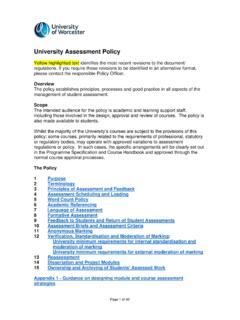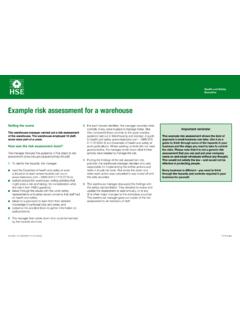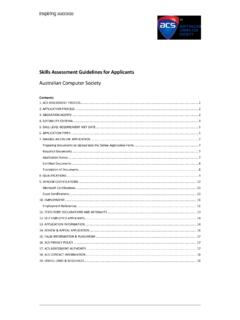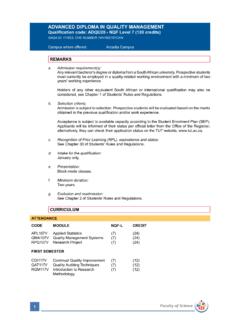Transcription of Taught Courses Regulatory Framework
1 Academic Regulations and Procedures: Taught Courses Regulatory Framework Page 1 Taught Courses Regulatory Framework All postgraduate and undergraduate Taught awards offered by the University of Worcester are subject to the regulations as set out in this document unless, for reasons of professional or statutory body requirements or similar a variation or exception has been agreed by Academic Board. Such variations will be identified in the relevant Programme Specification. Yellow highlighted text identifies the most recent revisions to the regulations. If you require these revisions to be identified in an alternative format, please contact the Secretary to Academic Board.
2 1. Terminology As a means of ensuring that the regulations are consistently interpreted and applied, the following definitions have been used: Aegrotat award: An award made to a student on the clear understanding that had the student not been unwell, he or she would have passed. Assessment: The process by which the University is able to confirm that a student has achieved the learning outcomes for a module. Assessment is work, such as an examination, essay, report, test, portfolio, practical or project undertaken by a student; there may be one or more items of work which make up the components of assessment; the grade (which may include pass or fail) contributes to the evaluation of the student's performance and the determination of his or her entitlement to proceed with the course or eligibility for an award.
3 Assessment Item: a piece of assessed work, an essay, project, assignment or examination. Award: A formal qualification awarded by the University to an individual student HND, FdSc, BSc (Hons), PG Cert, MA which may be either the qualification to which a student is registered or an intermediate award. Award Title: the name of the course which is appended to an Award HND in Award Title as it is to appear on an award certificate and transcript. All award titles must be approved by the Academic Planning and Portfolio Group. Course: a defined combination of modules in one or more subjects leading to an award of the University Co-requisite module: a module that must be taken at the same time as another specified module.
4 Credit: a value assigned to a module. Credit is a quantified means of expressing equivalence of learning . Credit is awarded to a learner in recognition of the verified achievement of designated learning outcomes at a specified level. One credit point is awarded for ten hours of notional student learning which includes, as appropriate, lectures, practical classes, tutorials, fieldwork, assignments, private study and assessment. Academic Regulations and Procedures: Taught Courses Regulatory Framework Page 2 Dissertation: a substantial piece of work following detailed investigation and research into a subject or work related practice by a student.
5 Such work is carried out independently with minimum supervision. A Dissertation at Level 6 will have a minimum credit value of 30 credits and at Level 7 will have a minimum credit value of 45 and a maximum of 60 credits. A student may take only one Dissertation at each level. Designated module: a module at Level 4 specified as acceptable for meeting the requirements of the award that a student must take. A designated module is determined by the course or subject within which it is validated. Examination: any form of assessment, which takes place under supervision at a prescribed time and place and for a prescribed maximum period. Grade: the letter code used to indicate the standard reached by a student in the item(s) of assessment and the overall module assessment.
6 Integrated Master s: an award designed to enable students to progress from Level 4 though to 7 within one course. A student may be admitted to a linked undergraduate Honours degree/Integrated Master s degree course ( MComp/BSc (Hons) Computing or onto a standalone Integrated Master s degree. Intermediate Award: an award which can be obtained en route to the final Award such as a Certificate of Higher Education (CertHE) en route to a FdSc. Intermediate Awards are not awarded to a student who is continuing towards a higher award. The appropriate Intermediate Award(s) will be identified in the Programme Specification. Joint Honours: students will study modules from two subjects usually half the credits for the award are taken in both subjects.)
7 Level: a description of the higher education module credit level 4, 5, 6 or 7 which is an indicator of the relative demand, complexity and depth of learning and of learner autonomy A student may be described as studying at a Level. Level Description Framework for Higher Education Qualification Levels (FHEQ) Level 3 Foundation level Level 4 Certificate level 4 Level 5 Intermediate level 5 Level 6 Honours level 6 Level 7 Master s level 7 Level 8 Doctoral level 8 Mandatory Module: a prescribed module that forms a compulsory part of a course. A mandatory module will provide fundamental knowledge, skills or understanding that a student Academic Regulations and Procedures: Taught Courses Regulatory Framework Page 3 must acquire in order to successfully achieve the learning outcomes for the course.
8 A mandatory module must normally be passed in order to satisfy the requirements of an award. A mandatory module is determined by the course or subject within which it is validated. Major/Minor Honours: students will study modules from two subjects usually two thirds of the credits for the award are taken in one subject (major) with the remaining credits taken in the second subject (minor). Mode of Study: There are two modes of study, full-time and part-time. Full-time normally requires registration for modules to a value of not fewer than 60 and not more than 75 credits in a semester. Part-time normally requires registration for modules to a value of not more than 45 credits in a semester.
9 Module: a discrete unit of study with approved learning outcomes and assessment scheme. Modules are assigned to one or more subject areas. Each module will specify a level that indicates the intellectual standard required to successfully complete the module. Most modules are of a standard credit value although some modules ( a Dissertation) may have a different credit value. Module Outline: A document that is presented to students at the start of the module that includes (amongst other matters) the module code, module title, level, planned teaching activity, specific professional body attendance requirements, assessment, resource lists and assessment. Module Specification: A document that is presented and approved as part of the course approval process and specifies (amongst other matters) the module code, module title, level, credit value, the subject to which the module belongs, intended learning outcomes and assessment.
10 Maximum period of registration: the maximum permitted period of time to complete a course specified at the time of admission. Mitigation: exceptional reasons outside of a student s control that either prevented a student from taking an item of assessment or affected his or her performance in an assessment. Optional Module: a module specified as acceptable for meeting the requirements of the award, and chosen from a designated list. An optional module is determined by the course or subject within which it is validated. Placement Year or Year Abroad: a year where an undergraduate student may apply to extend their studies and spend the third year of their course either studying at a partner institution, on a work placement or undertaking a combination of both.








